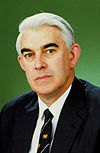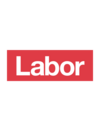Division of Werriwa
| Werriwa Australian House of Representatives Division | |
|---|---|
 Division of Werriwa in New South Wales, as of the 2016 federal election | |
| Created | 1901 |
| MP | Anne Stanley |
| Party | Labor |
| Namesake | Lake George (Aboriginal name) |
| Electors | 126,141 (2022) |
| Area | 172 km2 (66.4 sq mi) |
| Demographic | Outer metropolitan |
The Division of Werriwa is an Australian electoral division in the state of New South Wales. The name Werriwa derives from a local Aboriginal name for Lake George, which was located in the division when it was established in 1900. The division was one of the original 65 divisions first contested at the first federal election.
Werriwa now covers an area in south-west Sydney, including the suburbs of Ashcroft, Austral, Bonnyrigg Heights, Bradfield, Busby, Carnes Hill, Cartwright, Casula, Cecil Hills, Edmondson Park, Glenfield, Green Valley, Heckenberg, Hinchinbrook, Horningsea Park, Hoxton Park, Long Point, Lurnea, Macquarie Fields, Macquarie Links, Middleton Grange, Miller, Prestons, Sadleir, and West Hoxton; as well as parts of Badgerys Creek, Bonnyrigg, Bringelly, Cecil Park, Denham Court, Ingleburn, Kemps Creek, Leppington, Mount Pritchard, and Rossmore.
The current Member for Werriwa, since the 2016 federal election, is Anne Stanley, a member of the Australian Labor Party.
Geography
[edit]Since 1984, federal electoral division boundaries in Australia have been determined at redistributions by a redistribution committee appointed by the Australian Electoral Commission. Redistributions occur for the boundaries of divisions in a particular state, and they occur every seven years, or sooner if a state's representation entitlement changes or when divisions of a state are malapportioned.[1]
History
[edit]
Originally, Werriwa was a large and mostly rural electorate that stretched from south-west Sydney to the northern part of what is now the ACT, and included the Southern Highlands, Goulburn, and part of the South West Slopes. In succeeding years, with demographic change and electoral redistributions, Werriwa began to shrink and, from 1913 onwards, no longer included Lake George. It underwent several other major changes to its borders over the years. The 1949 expansion of Parliament saw Werriwa lose most of its remaining rural territory to the newly created Division of Macarthur and move to approximately its current position in south-west Sydney, over 150 kilometres (93 mi) away from Lake George. However, it has retained the name of Werriwa, primarily as it is an original Federation electorate—the Australian Electoral Commission's guidelines on electoral redistributions require it to preserve the names of original Federation electorates where possible.[2]
It is a very safe seat for Labor, which has held it continuously since 1934 and for all but nine years since 1906.
Werriwa is best remembered for being the electorate of former Prime Minister Gough Whitlam, who held it from 1952 to 1978. It was represented from 1994 to 2005 by one of Whitlam's former aides, Mark Latham, the leader of the ALP and Leader of the Opposition from 2003 to 2005. In more recent times, a by-election in March 2005 resulted in Labor's Chris Hayes elected with over 55% of the vote, in a 16-candidate race which saw no other candidate poll above 8%.
Demographics
[edit]Werriwa is a heavily working class electorate and is considered part of Labor's Western Sydney "Red Wall" (seats that are reliably safe for Labor).[3]
Werriwa is home to relatively large immigrant communities. According to the 2016 census, 64.8% of electors had both parents born outside of Australia.[4] 40.0% of people only speak English at home.[4] Other languages spoken at home include Arabic 10.1%, Vietnamese 6.3%, Hindi 4.3%, Spanish 2.8% and Italian 2.2%.[4]
Members
[edit]| Image | Member | Party | Term | Notes | |
|---|---|---|---|---|---|

|
Alfred Conroy (1864–1920) |
Free Trade | 29 March 1901 – 1906 |
Lost seat | |
| Anti-Socialist | 1906 – 12 December 1906 | ||||

|
David Hall (1874–1945) |
Labor | 12 December 1906 – 1 April 1912 |
Previously held the New South Wales Legislative Assembly seat of Gunnedah. Resigned to become a member of the New South Wales Legislative Council | |

|
Benjamin Bennett (1872–1939) |
1 June 1912 – 23 April 1913 |
Retired | ||

|
Alfred Conroy (1864–1920) |
Liberal | 31 May 1913 – 5 September 1914 |
Lost seat | |

|
John Lynch (1862–1941) |
Labor | 5 September 1914 – 14 November 1916 |
Lost seat | |
| National Labor | 14 November 1916 – 17 February 1917 | ||||
| Nationalist | 17 February 1917 – 13 December 1919 | ||||

|
Bert Lazzarini (1884–1952) |
Labor | 13 December 1919 – 27 March 1931 |
Lost seat | |
| Labor (NSW) | 27 March 1931 – 19 December 1931 | ||||

|
Walter McNicoll (1877–1947) |
Country | 19 December 1931 – 14 September 1934 |
Resigned to become Administrator of the Territory of New Guinea | |

|
Bert Lazzarini (1884–1952) |
Labor (NSW) | 15 September 1934 – February 1936 |
Served as minister under Curtin, Forde and Chifley. Died in office | |
| Labor | February 1936 – 1 October 1952 | ||||

|
Gough Whitlam (1916–2014) |
29 November 1952 – 31 July 1978 |
Served as Opposition Leader from 1967 to 1972, and from 1975 to 1977. Served as Prime Minister from 1972 to 1975. Resigned to retire from politics | ||

|
John Kerin (1937–2023) |
23 September 1978 – 22 December 1993 |
Previously held the Division of Macarthur. Served as minister under Hawke and Keating. Resigned to retire from politics | ||

|
Mark Latham (1961–) |
28 January 1994 – 21 January 2005 |
Served as Opposition Leader from 2003 to 2005. Resigned to retire from politics. Later elected to the New South Wales Legislative Council in 2019 | ||

|
Chris Hayes (1955–) |
19 March 2005 – 21 August 2010 |
Transferred to the Division of Fowler | ||

|
Laurie Ferguson (1952–) |
21 August 2010 – 9 May 2016 |
Previously held the Division of Reid. Retired | ||

|
Anne Stanley (1961–) |
2 July 2016 – present |
Incumbent |
Election results
[edit]| Party | Candidate | Votes | % | ±% | |
|---|---|---|---|---|---|
| Labor | Anne Stanley | 40,108 | 39.86 | −7.90 | |
| Liberal | Sam Kayal | 30,864 | 30.67 | −4.60 | |
| Liberal Democrats | Victor Tey | 8,978 | 8.92 | +8.92 | |
| United Australia | Tony Nikolic | 8,813 | 8.76 | +4.56 | |
| Greens | Apurva Shukla | 6,772 | 6.73 | +1.36 | |
| One Nation | Adam Booke | 5,096 | 5.06 | +5.06 | |
| Total formal votes | 100,631 | 90.18 | +1.75 | ||
| Informal votes | 10,962 | 9.82 | −1.75 | ||
| Turnout | 111,593 | 88.53 | −2.00 | ||
| Two-party-preferred result | |||||
| Labor | Anne Stanley | 56,173 | 55.82 | +0.35 | |
| Liberal | Sam Kayal | 44,458 | 44.18 | −0.35 | |
| Labor hold | Swing | +0.35 | |||

 indicates at what stage the winning candidate had over 50% of the votes and was declared the winner.
indicates at what stage the winning candidate had over 50% of the votes and was declared the winner.References
[edit]- ^ Muller, Damon (14 November 2017). "The process of federal redistributions: a quick guide". Parliament of Australia. Retrieved 19 April 2022.
- ^ "Guidelines for naming divisions". Australian Electoral Commission. 20 July 2011. Retrieved 30 March 2013.
- ^ Fuentes, Fred (26 May 2022). "Keneally's defeat in Fowler is just the tip of the iceberg. Labor's 'red wall' is crumbling". Green Left. Retrieved 30 May 2022.
- ^ a b c "2016 Werriwa, Census All persons QuickStats | Australian Bureau of Statistics". www.abs.gov.au. Retrieved 30 May 2022.
- ^ Werriwa, NSW, 2022 Tally Room, Australian Electoral Commission.
